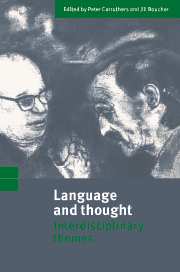Book contents
- Frontmatter
- Contents
- List of contributors
- Preface
- 1 Introduction: opening up options
- Part I Language, development and evolution
- Introduction to part I
- 2 Thought before language: the expression of motion events prior to the impact of a conventional language model
- 3 The prerequisites for language acquisition: evidence from cases of anomalous language development
- 4 Some thoughts about the evolution of LADS, with special reference to TOM and SAM
- 5 Thinking in language? Evolution and a modularist possibility
- Part II Language, reasoning and concepts
- Part III Language and conscious reasoning
- References
- Author index
- Subject index
Introduction to part I
Published online by Cambridge University Press: 08 January 2010
- Frontmatter
- Contents
- List of contributors
- Preface
- 1 Introduction: opening up options
- Part I Language, development and evolution
- Introduction to part I
- 2 Thought before language: the expression of motion events prior to the impact of a conventional language model
- 3 The prerequisites for language acquisition: evidence from cases of anomalous language development
- 4 Some thoughts about the evolution of LADS, with special reference to TOM and SAM
- 5 Thinking in language? Evolution and a modularist possibility
- Part II Language, reasoning and concepts
- Part III Language and conscious reasoning
- References
- Author index
- Subject index
Summary
The chapters in Part I of this book all focus on issues concerning the emergence of language and cognition during child development, and concerning the evolution of linguistic capacities and distinctive human intelligence in our hominid past. Following some general introductory remarks on the way in which these issues are relevant to the debate over the relationship between language and thought, we will provide some brief background discussion for each of the four chapters.
Any position one might adopt on the question of the relationship between language and thought will carry commitments, of one sort or another, concerning the structure and organisation of mature human cognition. And that, in turn, may have implications for the kind of developmental story which it is possible to tell. Moreover, whatever account is given of mature human cognition had better permit some plausible account to be provided of the evolutionary origins of the latter. For example, suppose one held that language is the vehicle for certain kinds of thought; say all propositional thought – hence being committed to the cognitive conception of language in quite a strong form. In that case one had better maintain that language-acquisition is a necessary condition for young children to engage in propositional thinking; and that those children who are deprived of, or delayed in the acquisition of, language will be incapable of entertaining just these kinds of thought. Similarly, one had better be prepared to give an account of human evolution such that no capacities for propositional thought were present prior to the evolution of linguistic ability (e.g. Bickerton, 1990, 1995).
- Type
- Chapter
- Information
- Language and ThoughtInterdisciplinary Themes, pp. 21 - 25Publisher: Cambridge University PressPrint publication year: 1998



